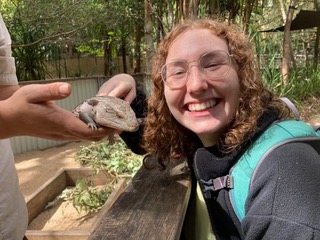Student Reflection
Australia Student Reflection Katelynn Mulrooney
 Coming back from Australia has been disappointing to say the least. It was hard to bring myself back from a place with such incredible biodiversity. I just barely scratched the surface of seeing what you don’t see anywhere else in the world! Although I tried to not have expectations of what animals I would see before heading on this trip, I found myself quickly throwing that out the window as I got there and started seeing the incredible wildlife around us on land and in the water. I found myself trying to constantly look up and down trying to eye everything I could possibly see—but with bad eyesight and horrible spotting abilities, I felt lucky to have so many others around that were good at pointing things out :) ...
Coming back from Australia has been disappointing to say the least. It was hard to bring myself back from a place with such incredible biodiversity. I just barely scratched the surface of seeing what you don’t see anywhere else in the world! Although I tried to not have expectations of what animals I would see before heading on this trip, I found myself quickly throwing that out the window as I got there and started seeing the incredible wildlife around us on land and in the water. I found myself trying to constantly look up and down trying to eye everything I could possibly see—but with bad eyesight and horrible spotting abilities, I felt lucky to have so many others around that were good at pointing things out :) ...
I think the beauty of Project Dragonfly in Earth Expeditions courses is that the learning and key tenets aren’t confined to the classroom. As you connect with each other and experience a new place in the world, inquiry, community engagement, environmental stewardship, and global/local understanding seep into all other conversations and interactions.
One night as we had some free time before dinner on Magnetic Island, (another Dragonfly student) and I went down by the water to watch the sunset and reflect on the program thus far. As the sun was setting, we kept seeing what we thought were flying foxes right above us, disappearing into the trees. As we were talking we kept getting distracted trying to figure out where they were going and what trees they might be in/why. As this natural inquiry started overtaking our conversation and the light grew dimmer, we began searching the trees with our lights trying to find differences in the trees that might lead us to their hang out spot. As we waited, observing one of the fruiting palms, we saw a flying fox land high up in the leaves along with others we had most likely seen fly above us earlier in the evening.
Although this wasn’t part of our direct coursework, our shared curiosity and questioning led us to understanding a bit more about the environment around us. As Chris M., Lynne M., and Richard H. (2009) said, “inquiry… is not simply a means to teach students science. It is a process of engagement and dialogue.”
